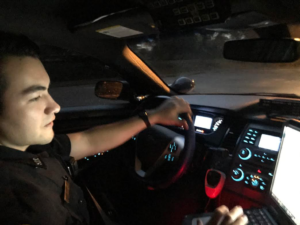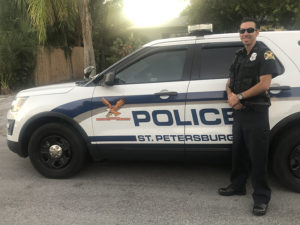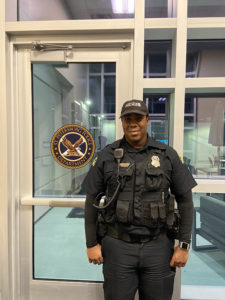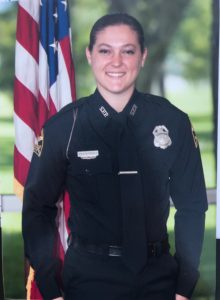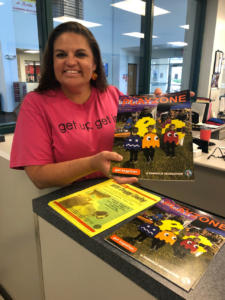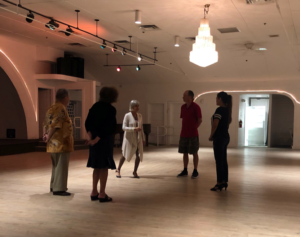With a shovel and determination, volunteer Vanessa Gray uncovers forgotten graves in long-neglected black cemetery
Psst! Food pantry is a well-kept secret
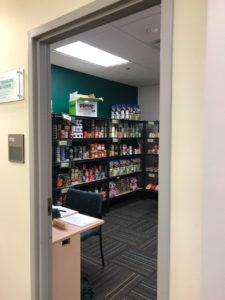
The Support-a-Bull Market was supposed to help address student hunger.
By ASHLEY CAMPBELL
USFSP Student Reporter
ST. PETERSBURG – When the campus established a food pantry last spring, both Student Government and administration stressed that it would help students who sometimes go hungry.
Regional Chancellor Martin Tadlock said that addressing what he called “food insecurity” would help students concentrate on their academics, keep them in school and improve the campus’ student retention rate.
The retention rate is one of the yardsticks, or metrics, that the Legislature uses in determining whether a school becomes, or remains, a “preeminent research university” that is entitled to extra state funding.
But so far the new pantry – called the Support-a-Bull Market – has the appearance of a well-kept secret.
It’s in a room off a hallway on the first floor of the Student Life Center. There are no signs pointing the way to the pantry, and most of the time the door is padlocked.
A sign on the door says the pantry’s hours are “TBD.” If students need help, the sign says, they should call the office of the dean of students at (727) 873-4278.
So far, about 20 students have used the pantry, said Joseph Contes, the assistant director of the Office of Student Outreach and Support (SOS).
The pantry is the responsibility of SOS, which is charged with helping students manage stress and the barriers that affect their health and wellness.
The SOS website describes what items are available in the pantry, which relies primarily on monthly food donations from RSC Pinellas (Religious Community Services Inc.), a nonprofit charity that helps people facing hunger, homelessness and domestic violence.
As of October, more than 500 pounds of food had been donated, according to SOS.
The website also lists the hours the pantry is open: Mondays from 11 a.m. to 2 p.m., Tuesdays and Wednesdays from 8 to 9:15 a.m., Thursdays from 8 a.m. to 1 p.m. and Fridays from 11 a.m. to 2 p.m.
So why is the pantry tucked away like an afterthought and open only 13 and a half hours a week?
And why aren’t the hours of operation posted on the padlocked door?
Contes, 33, said that SOS can’t afford to keep the pantry open for more hours.
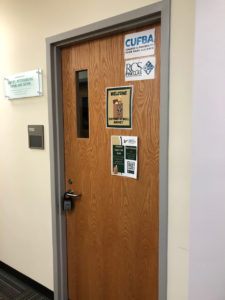
Most of the time, the pantry is dark and its door padlocked.
“There is no recurring funding,” he said. University alumni donated about $5,000 for the pantry and that’s all SOS has to work with, since the university itself provides nothing, he said.
The location is out of the way because it was the only space available, he said. He hopes to move the SOS office to the SLC so it is closer and more convenient for the pantry, but all of the offices there are being used, he said.
If a student wants to request food, they must call within business hours and wait for someone to come help them. Then the student fills out an intake request form, provides their U-number and gets a receipt to take items from the pantry.
For some students, it might be embarrassing to admit they are financially strapped and hungry.
But the pantry does not provide discreet access. The students who use it must be monitored “to make sure the resources aren’t abused,” said graduate assistant Meghan Yacinthe, 22, one of the two students who staff the pantry.
SOS can only afford to pay for one work study student for the year. The other student monitor works for the university housing staff.
Despite the pantry’s bumpy start, Contes has ambitious goals for it.
He wants to increase student use, develop sources of recurrent funding, and get a refrigerator for fresh options like bread, fruits and vegetables, and dairy products.
Most importantly, he said, he wants to tear down the stigma that people only go to a food pantry when they are in dire need. He wants students to use the pantry even if it is just for a snack between classes, he said.
Without more funding, however, it is unclear how long the pantry will stay open. The donated funding was only enough to open the pantry and pay for one student employee for the year, said Contes.
This month the university began a “Herdfunder Drive,” asking faculty, staff and friends of the university to contribute so that the pantry’s hours can be extended and its offerings expanded to include hygiene products like toothbrushes.
As of Dec. 11, 34 donors had pledged $1,365 – 46 percent of the goal of $3,000. The drive is scheduled to end Dec. 16.


